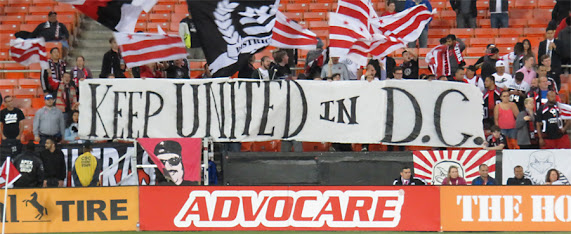 |
Fans at RFK Stadium Hold Banner to Keep United in DC
(Photo: Doug Barnes) |
By Douglas Barnes, Tod Lindberg and David Rusk
First Published as Opinion in The Washington Post, December 12, 2014
Republished with minor updating, November 19, 2021
Preface: The writers are co-chairs of District Citizens United for a Soccer Stadium, an independent grass-roots group.
As committed soccer fans, we’re delighted that the D.C. Council is poised to give final approval at its next meeting to legislation that will enable D.C. United to build a permanent District home in Southwest. The Stadium Act won unanimous approval at the bill’s first reading Dec. 2.
And as District residents and taxpayers, we’re especially gratified that the stadium deal is good news for city residents, even those who are not soccer fans. The city will reap substantial benefits from the development of Buzzard Point.
The deal is a public-private partnership in which the city will acquire and prepare the site, then lease it for 30 years to the team, which will build the stadium. The District’s side of the partnership is capped at $150 million.
What kind of return will the city get on such a large investment? To start, D.C. United will stay in the District, and its owners will be making a $150 million investment to build the stadium. The team has been losing millions of dollars annually playing at the dilapidated RFK Stadium, and long-term financial success for Major League Soccer franchises usually hinges on the team owning and controlling the revenue from a stadium designed for soccer.
D.C. United’s quest for a stadium site has been one of the longest in MLS, spanning eight years and two false starts. If the Buzzard Point deal had fallen apart, the likelihood of the team remaining in the city, perhaps even the area, would have been low. Now the District will be the permanent home of a thriving business generating significant tax revenue.
How much revenue? The council commissioned the consulting firm Conventions, Sports and Leisure International (CSL) to conduct an independent assessment of the fiscal costs and benefits of the stadium deal proposed by Mayor Vincent C. Gray (D). The council has since altered the deal, dropping a controversial proposal for the District to acquire some of the land at Buzzard Point by swapping it for the Frank D. Reeves Municipal Center property at 14th and U streets NW. But the CSL study of cash in and cash out over the 30-year-plus life of the deal still supports the stadium site.
Let’s start with the basics. Say the District ends up laying out the maximum $150 million it has committed (D.C. United has agreed to pay any additional expenses). Over the 30 years of the deal, that investment will generate $187.2 million in new taxes in today’s dollars, for a net gain of $37.2 million.
In addition, the land the District is acquiring and will still own at the end of the lease will increase in value. Building the stadium, according to CSL, will accelerate local development and land appreciation at Buzzard Point by eight to 10 years. We have conservatively estimated that this faster appreciation of the land will add about $40 million in value in today’s dollars to the District’s Buzzard Point land.
All major infrastructure projects benefit from complementary investments. The nearly $1 billion the District plans to invest in the Frederick Douglass Bridge and the South Capitol Street Corridor would enhance the stadium by providing better transportation access and nearby green space. The stadium also would link development of the long-neglected Anacostia waterfront with the major new Wharf development along Washington Channel. All of these features will attract more soccer and baseball fans and people wanting to experience the new parks, restaurants, bicycle trails and other amenities coming to Buzzard Point.
The issues surrounding the Reeves Center property and the anticipated construction of its replacement in Ward 8 remain for another day. For now, though, the council looks poised to approve a stadium deal that is good for sports fans, residents and businesses in Southwest and all District taxpayers.

No comments:
Post a Comment